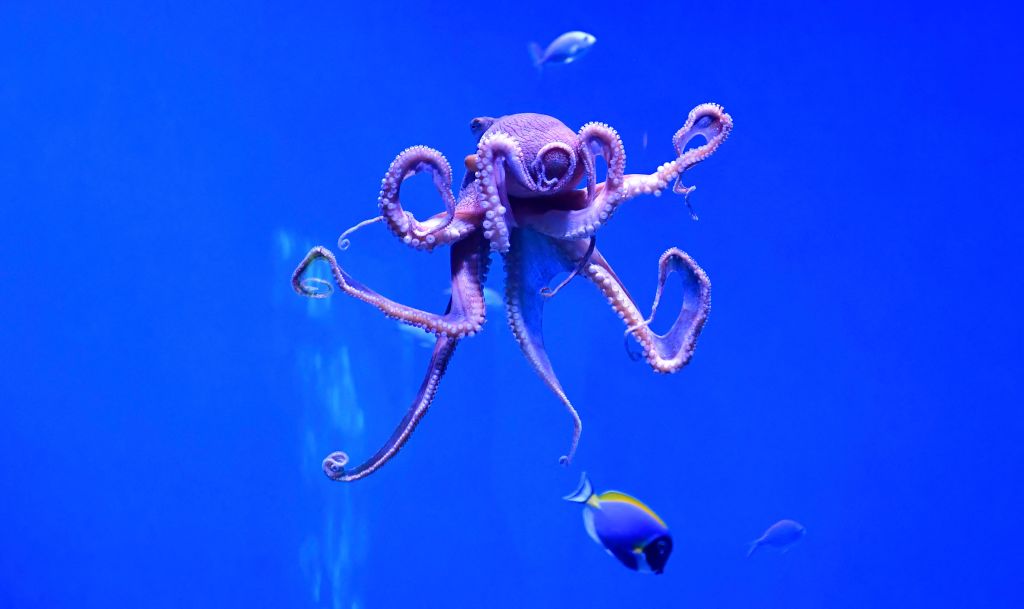Summary of Octopus Amazing Visual Vision Helps Them Map Out Different Locations Underwater:
A recent study found that octopuses have a unique visual system that allows them to navigate underwater and locate areas without sunlight. The study examined the octopus’s powerful visual skills and how they evolved their brains and vision. Using fluorescent microscopy, researchers observed the octopus’s visual responses to light and dark stimuli. The discovery is significant in understanding the connection between sensations and brain activity. Octopuses also have exciting facts, such as two-thirds of their neurons being in their arms and having three hearts. Further studies are needed to explore the detailed response properties of octopus vision.
*****
Octopus Amazing Visual Vision Helps Them Map Out Different Locations Underwater
– Octopuses possess a powerful visual system that allows them to navigate and locate different areas underwater.
– Their visual skills have evolved to provide high-resolution vision in dark environments.
– Octopuses devote a significant portion of their brainpower to vision, which aids in their survival.
– The optic lobe of the octopus brain plays a crucial role in processing visual information.
– Further studies are needed to understand the detailed response properties of the octopus visual system.
The octopus, an intriguing sea creature, possesses a unique visual system that enables it to map out different locations underwater. Recent research has shed light on the remarkable visual abilities of octopuses, providing valuable insights into their navigation skills and potentially offering new understandings of human vision.
While animals in various environments or ecosystems rely on their vision for survival, octopuses have developed a potent visual system. A recent report published in Phys.org highlighted the findings of a study exploring the visual abilities of these cephalopods. The researchers discovered that octopuses devote a significant portion of their brain’s processing power to vision, allowing them to clearly perceive their surroundings.
The study, published in the journal Current Biology, revealed that octopuses possess camera-type eyes that provide high-resolution vision even in dark environments. This visual prowess has played a crucial role in their survival, aiding them in evading predators and finding potential prey.
To better understand how octopuses navigate and locate underwater areas, researchers observed their visual responses to neutral activity in light and dark settings. The study revealed that octopuses have independently evolved their brains and visual systems, making their vision distinct from other species.
One of the critical discoveries of this research was the mapping of the octopus’s optic lobe, which is responsible for processing visual information. By studying the responses of various categories of neurons in the optic lobe, the researchers gained insight into how octopuses perceive light and dark stimuli.
Using fluorescent microscopy, the scientists could observe the activity of these neurons based on the octopus’s responses to light and dark spots. They found that the visual systems of octopuses respond differently to various sensory stimuli, demonstrating the unique characteristics of their visual perception.
Identifying these specific response properties is a significant step in understanding the intricate connection between sensations and brain activity. Researchers can unravel the complex workings of their visual system by pinpointing the areas of the octopus’s brain that are activated in response to light and dark stimuli.
Further studies are needed to delve into the octopus visual system’s detailed response properties and image processing capabilities. By conducting more in-depth research, scientists hope to better understand how octopuses perceive and interpret their underwater environment. This knowledge could have applications not only in the field of marine biology but also in the study of human vision.
Aside from their remarkable visual abilities, octopuses possess other intriguing characteristics. For instance, it is widely known that two-thirds of the octopus’s neurons are located in their arms, allowing them to perform various tasks simultaneously. This unique distribution of neurons contributes to the octopus’s highly adaptable and intelligent behavior.
Furthermore, octopuses have three hearts within their bodies. Two of these hearts are responsible for pumping blood to the animal’s gills, while the third heart ensures circulation throughout its body. Octopuses also possess blue blood, an interesting adaptation that sets them apart from other creatures.
In addition to their physiological adaptations, octopuses are masters of camouflage. They can change their skin’s color and texture, allowing them to blend seamlessly into their surroundings. This skill is crucial for evading predators and ambushing unsuspecting prey.
In conclusion, the latest research into the visual system of octopuses has unveiled their incredible abilities to navigate and locate different areas underwater. Their powerful visual skills and unique adaptations have allowed them to thrive in diverse aquatic environments. As scientists unravel the mysteries of the octopus’s visual system, new insights may emerge, deepening our understanding of marine life and the human visual system.


